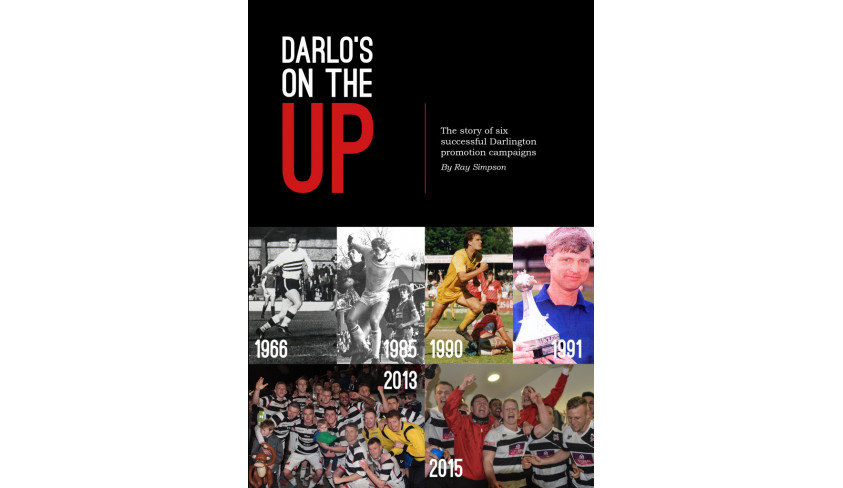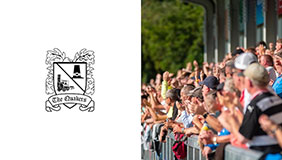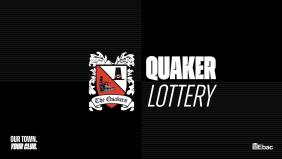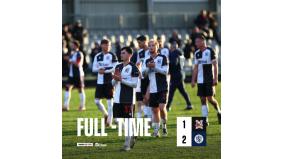How we won the Fourth Division title
Throughout our 90s celebrations, we're looking at our title winning campaigns, and today we look at the early part of the 1990-91 Fourth Division winning season, as described in Darlo's on the Up, the book published in 2015.
There was plenty of optimism amongst the fans about the team’s chances for the new season after winning promotion from the Conference, and there was even talk of winning promotion from the Fourth Division, especially after manager Brian Little announced the signing of the experienced Mick Tait from Portsmouth. Tait, who was born in the north east, could play in either defence or midfield, and he would be used mainly as a sweeper.
Little retained most of the previous season’s squad, although Archie Stephens had decided to turn down a new contract and signed for Guisborough in the Northern League, and Gary Hyde, who had been on the fringe of the team during the Conference season, signed for Leicester City.
“We’ve got a good squad of experienced players while other teams in our division rely on a handful of senior professionals and youngsters. I think this will give us an edge and obviously we’re looking to progress,” said Little.
Pre season didn’t go as well as it had the previous year. Quakers beat Bishop Auckland in the Durham Senior Cup, but then lost to 2-1 to Hartlepool in the final. Brian Little said that at odds of 33/1 to win promotion, Hartlepool were worth a flutter.
In terms of distance, Darlo couldn’t have asked for a much tougher start to the season than away to Gillingham in Kent on August 25th. Gillingham were one of the teams fancied to win promotion.
There was a good following of Darlo fans at the Priestfield Stadium but Darlo lost the game 1-0, the home side scoring from the penalty spot after Les McJannet handled on the line. Steve Mardenborough was sent off for retaliation after he was tackled by Gillingham defender Billy Manuel. But nevertheless, it was still a promising performance.
“We have done ok, but lessons have to be learned,” said Brian Little. “We’ve learned that if we make mistakes, we will be punished for them, not like last season. We will win games away from home playing like that.”
Ray Simpson wrote in the Northern Echo; “The Conference certainly wasn’t like this. This display was perhaps not everything Darlington fans had hoped for, but there were signs justifying the early optimism.”
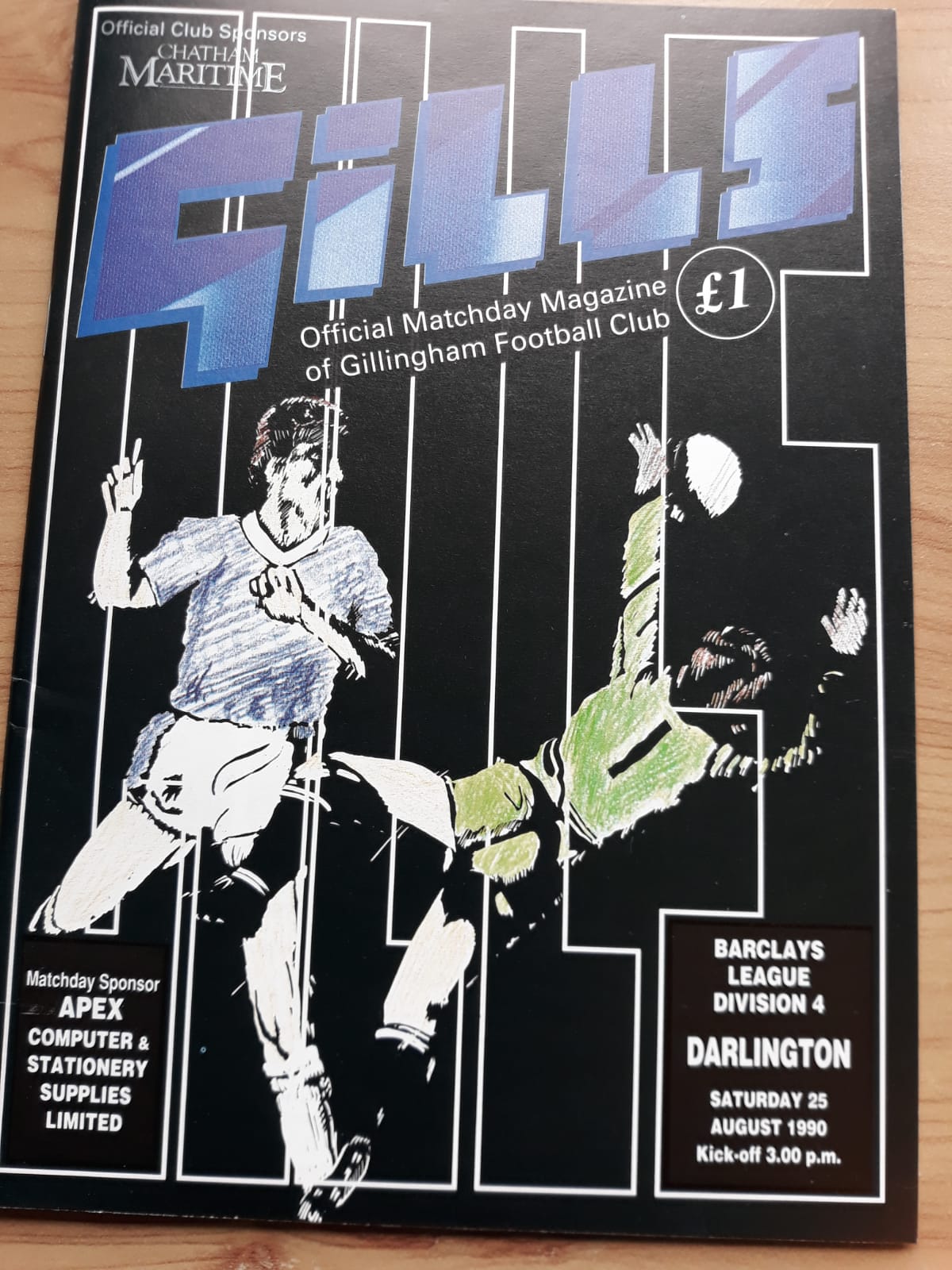
Darlo played their first League Cup tie – it was then know as the Rumbelows Cup -- for two seasons against relegated Blackpool three days later at Feethams, and they were held to a 0-0 draw in the first leg in front of a 2,254 crowd by their Fourth Division rivals. Quakers played well in midfield, and created plenty of chances, but they lacked a cutting edge. Mark Prudhoe pulled off a good save from Blackpool’s Trevor Sinclair late in the game.
Brian Little said; “We were the better side and played well for much of the game. This tie isn’t over yet, and Blackpool know it.” Kevin Dinsdale wrote in the Echo; “Darlington dominated long spells of the tie, but wasted their chances and face a difficult second leg.”
Burnley, who were expected to be in the promotion hunt, were the first league visitors of the season to Feethams, and they were beaten 3-1 by a very good Darlington performance. “Quakers silence their doubters,” was the headline in the Echo.
Brian Little said afterwards; “I think the manner in which we achieved that first win will show people that we can compete.”
Frank Gray put Darlo into the lead from the penalty spot, but Ron Futcher – brother of Paul who was later to briefly manage Darlington – equalised. Gary Gill restored Darlo’s lead with a 25 yard lob, then Les McJannet made it 3-1 from a David Cork pass.
In midweek, Darlo travelled across to the west coast for the return leg in the Rumbelows Cup against Blackpool and drew 1-1 to give them a boost and put them into the next round on away goals. Darlo withstood loads of Blackpool pressure in which Gary Brook scored from a Trevor Sinclair pass, but John Borthwick equalised with a header.
The game kicked off at 5pm because of work being carried out on the Bloomfield Road floodlights, and that was reflected in a low attendance of 1,696. “We had to work hard for our success, but it’s a sign of the progress we have made when you consider they were in the third division last season, and we were in the Conference,” said Brian Little.
There was a wider gap between Quakers and their next opponents in the Rumbelows Cup, Swindon Town. The Wiltshire outfit would have been a First Division club after beating Sunderland in the previous season’s Second Division play-off final, but were kept in the same division as a punishment for their involvement in making illegal payments to players.
Quakers had to settle for a 2-2 draw at Walsall in their next league game on September 8th after being 2-0 up at one point. Frank Gray tapped in after Les McJannet’s shot was blocked, and then John Borthwick and Andy Toman set up Gary Gill to score from a few yards, both goals coming by the 20th minute. But Walsall pulled one back before half time, and levelled eight minutes from the end, although Darlo were annoyed that a Mick Tait goal was disallowed at 2-1.
“Last season when we led 2-0, usually we won 2-0, but now we’re in a higher league and getting punished for our mistakes,” said Brian Little.
“Darlington’s Fourth Division education continued when they lost a two goal lead,” said Ray Simpson.
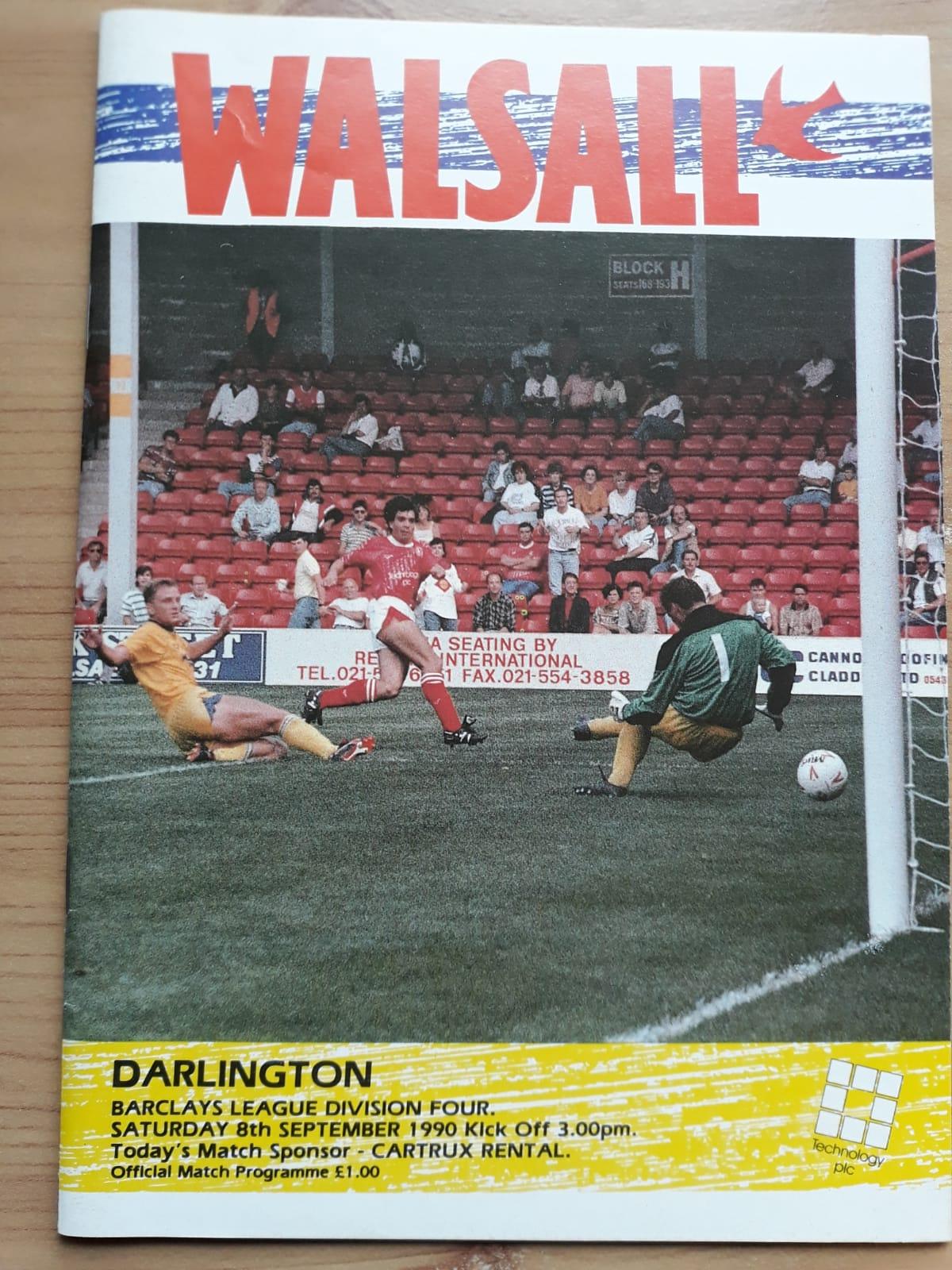
Halifax, whom Quakers had beaten in the FA Cup the previous season, came to Feethams, and were soundly beaten by the same 3-0 scoreline as they were in the FA Cup. David Cork put Darlo 1-0 up with a mishit shot, Les McJannet scored the second with a 30 yarder, and Gary Gill tapped in after Paul Emson’s shot was parried.
The win put Darlo fourth in the table after four league games, five points behind leaders Doncaster.
“Darlington’s promotion train may only have just left the station, but already there are signs pointing to Division Three at the end of the line,” wrote Nick Helliwell in the Echo.
Darlo then played their first local derby of the season on September 18th against York City at Feethams, and drew 0-0, with Nigel Pepper being sent off for the Minstermen for a high challenge on David Corner in front of 3,582. Quakers had the better chances but York keeper Chris Marples pulled off some good saves. It was York’s first point of the season.
“In a match spoilt by the fierce wind, the visitors will be happier,” wrote Nick Helliwell in the Northern Echo.
Over to Wales next, and a 1-1 draw against Wrexham at the Racecourse Ground. Quakers took the lead when John Borthwick scored from a David Cork through ball, and they paid the penalty for some missed chances when Chris Armstrong, later to move to Tottenham, equalised for Wrexham only three minutes after coming on as sub.
“Quakers are becoming hard to beat, they are finding winning equally difficult,” said Nick Helliwell in the Echo.
Brian Little said; “We’ve gone seven games without defeat, and we’re getting 60-70 per cent of the play even away from home. Perhaps we should have capitalised more on the chances we’ve created, but we’re not getting the run of the ball and we’re not far away from being a good side. It says something that we’ve played an away game and are disappointed not to have the three points.”
Nick Helliwell said; “On the evidence of this display, it will need more than fine tuning to turn Darlington into real title contenders.”
Feethams saw one of its best ever cup nights on September 25th, when Ossie Ardiles brought his Swindon team for the first leg of the Rumbelows Cup second round.
Quakers produced some great football, and took a three goal advantage going into the second leg, although they had an anxious first 20 minutes trying to cope with Swindon.
David Cork put Darlo into the lead on 50 minutes from a Gary Gill cross, then Frank Gray coolly made it 2-0 from the spot after Cork was brought down. And there was talk of a giantkilling when Cork scored the third from a poor clearance. No wonder the Echo headline read; “Cork stuns Swindon.”
Brian Little said; “We got frustrated and were struggling to cope with their style, but we had a couple of chances on the break and decided to leave things as they were. More performances like that could see us do well in the Fourth Division this season.”
Ardiles said; “We lost our discipline after half time, and Darlington made us pay heavily. They stopped us playing.”
Simon Turnbull wrote in the Echo; “Darlington achieved what Sunderland failed to do.”
The win brought back memories of that famous League Cup night in 1965, when Quakers came from behind and beat Swindon 2-1.
Quakers had another big test at league leaders Doncaster on September 29th, and they passed it with a 1-0 win, Doncaster-born David Cork running 40 yards on the end of a John Borthwick pass and scoring in the second half to stretch Darlo’s unbeaten run to nine league games.
Darlo certainly proved that they were going to be amongst the promotion challengers.
Brian Little said; “Doncaster made it very difficult for us to play our normal game but overall I think we handled things very well. Mark Prudhoe kept us in the game with a couple of great saves. In the second half we got stuck in and they rarely looked like breaking us down.”
Nick Helliwell wrote in the Echo; “Getting better all the time – that’s Darlington’s theme tune this season.”
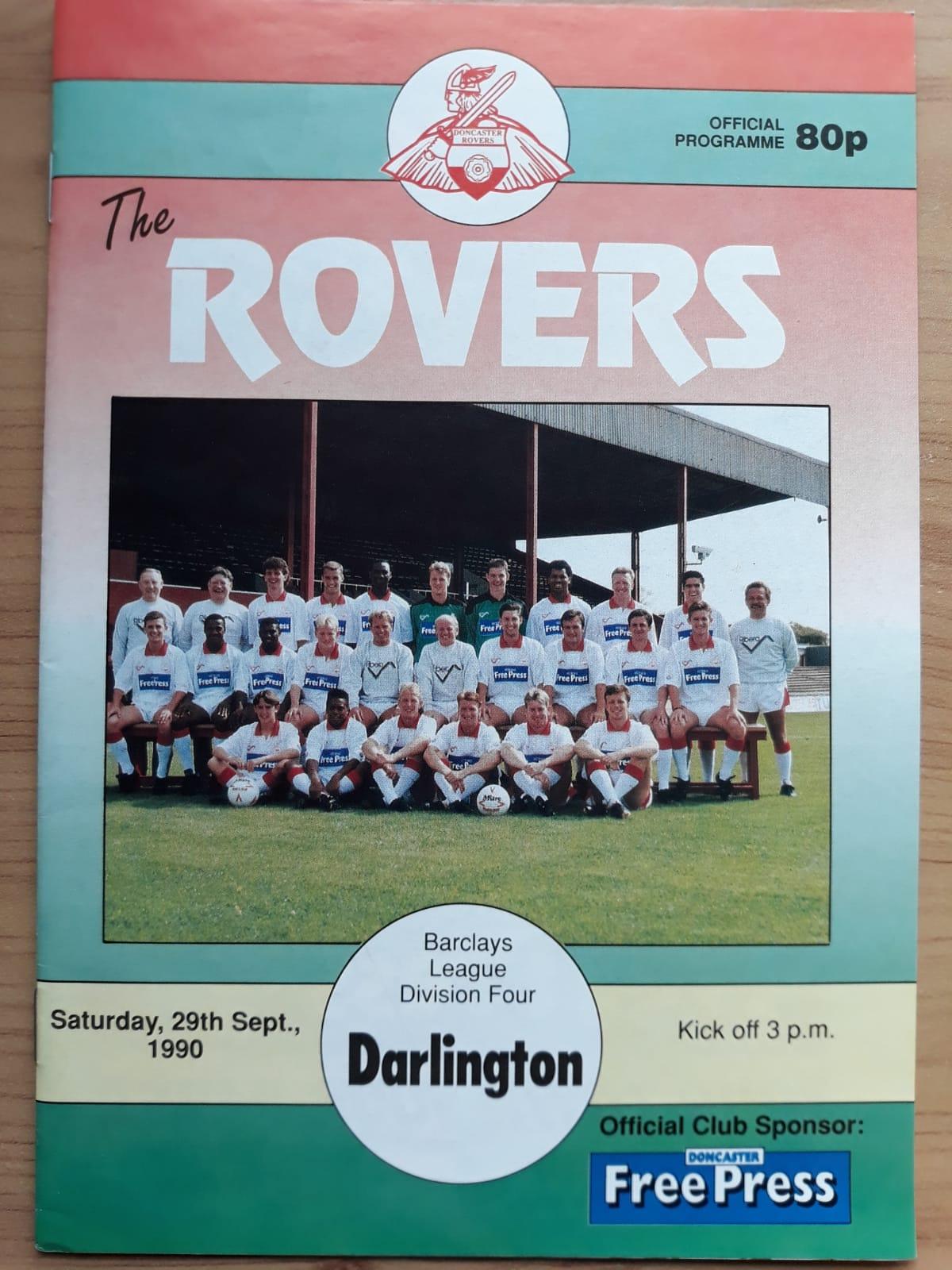
Three days later though, the nine game unbeaten run in league and cup was ended by Peterborough United, by 1-0 at Feethams, Paul Culpin scoring the goal nine minutes from the end. In the Posh dugout was Brian Little’s predecessor, Dave Booth, who was their assistant manager.
Darlo created several chances, with Les McJannet hitting the post and Gary Gill having a shot cleared off the line. “It can be a cruel game at times,” said manager Brian Little. “We will play a lot worse than that and still win matches.”
Nick Helliwell wrote in the Echo; “The goal made a nonsense of a second half almost totally dominated by the home side.”
Part 2 of our review of the 1990-91 championship winning season follows soon




